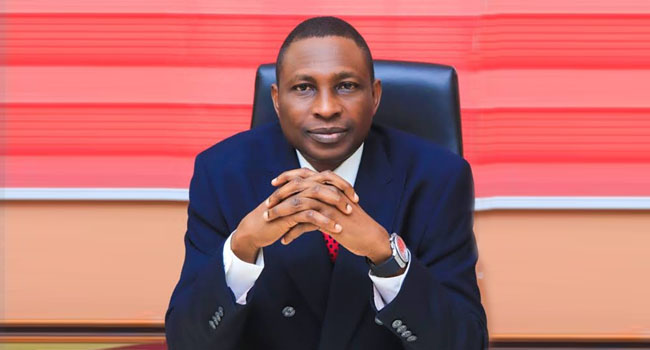The Economic and Financial Crimes Commission (EFCC) has released new information in its investigation of former Kogi State Governor Yahaya Bello. According to the anti-graft agency, the embattled ex-governor withdrew $720,000 from the state’s accounts to pay his child’s school fees in advance just before leaving office on January 27, 2024.
Ola Olukoyede, the EFCC’s boss, stated this to press on Tuesday at the Commission’s offices in Abuja’s Jabi region.
Olukoyede said that Bello transferred the funds from the state coffers to a Bureau de Change operator and used them to pay his child’s school fees in advance.
He said, “A sitting governor, because he knew he was leaving office, moved money directly from the government to Bureau de Change (and) used it to pay his child’s school fee in advance.
“Over $720,000 or thereabout, in anticipation that he was going to leave the Government House. In a poor state like Kogi? And you want me to close my eyes under the guise of ‘I’m being used’. Used by who? At this stage of my life? Used by who?
“I didn’t initiate the case; I inherit the case, I called for the case file and I said there are issues here.”
The EFCC chair sworn to follow the prosecution of the ex-governor to logical conclusion, saying that he will resign as EFCC chairman if Bello is not prosecuted.
He also vowed that all those who obstructed the arrest of the former governor would be brought to book.
The EFCC is seeking to arraign Bello on 19 counts bordering on alleged money laundering, breach of trust and misappropriation of funds to the tune of N80.2 billion.
He said that no matter what anyone does or the amount of attack against the anti-graft agency, he and his men will not relent in helping to sanitise the country.
Bello was the governor of the North Central state from January 27, 2016 to January 27, 2024 when he handed over to his fellow partyman in the All Progressives Congress (APC), Usman Ododo.
On April 17, 2024, armed EFCC operatives laid siege to Bello’s Abuja residence to arrest him but Ododo arrived at the house and allegedly whisked away his predecessor.
The EFCC subsequently declared Bello wanted, warning that obstruction to its operations won’t be tolerated, a moved backed by the Attorney General of the Federation and Minister of Justice, Lateef Fagbemi, who advised Bello to turn himself in.
Legal Fireworks
Meanwhile, the EFCC has served a copy of the charge sheet of alleged fraud to the tune of N80bn against the immediate past governor on his lawyer, Abdulwahab Mohamed.
This followed a Tuesday order by Justice Emeka Nwite of the Federal High Court in Abuja after Bello’s absence in court.
He was absent from court for his arraignment on a 19-count charge of alleged money laundering to the tune of ₦80bn.
The judge relied on section 384 (4 and 5) of the Administrative and Criminal Justice Act 2015, directing the counsel to the immediate past governor to receive a copy of the charge.
The court held that where it had become impossible to effect personal service of a legal process on a defendant, such could be done through substituted means.
Justice Nwite further held that it was clear that the former governor failed to appear in court for his arraignment.
Although Bello’s lawyer, Mohammed, initially declined to accept the charges and proof of evidence, he was compelled to do so by Justice Nwite.
The judge rejected the plea by the senior lawyer that a junior lawyer in his team, AI Musa, be the one to accept the charges on behalf of the former governor.
A member of the legal team for Bello, Adedayo Adedipe, told the court that his client would have made himself available, but was afraid of lack of fair hearing and justice.
He added that Bello was ready to appear before the court to answer the 19-count charge preferred against him by the EFCC.
Adedipe urged the court, to set aside the ex-parte order of arrest it had earlier issued against the former governor, saying that at the time the order of arrest was made, the charge had not been served on his client.
Illegal Organisation?
Bello had argued that the EFCC was an illegal organisation. According to him, the Federal Government did not consult the 36 states of the federation before enacting the EFCC Act through the National Assembly. He added that section 12 of the 1999 Constitution as amended, required the various Houses of Assembly to ratify the act before it could become operative.
Counsel to the EFCC, Kemi Phinheiro, however, urged the court to dismiss the application, insisting that the warrant of arrest should not be set aside until the defendant makes himself available for trial.
He argued that Bello did not have the legal ground to file numerous applications while in hiding.
Justice Nwite had last week issued a bench warrant against Bello following an application to that effect by EFCC.
The EFCC subsequently declared the former governor wanted for his persistent absence in court and for evading the criminal charges against him.



